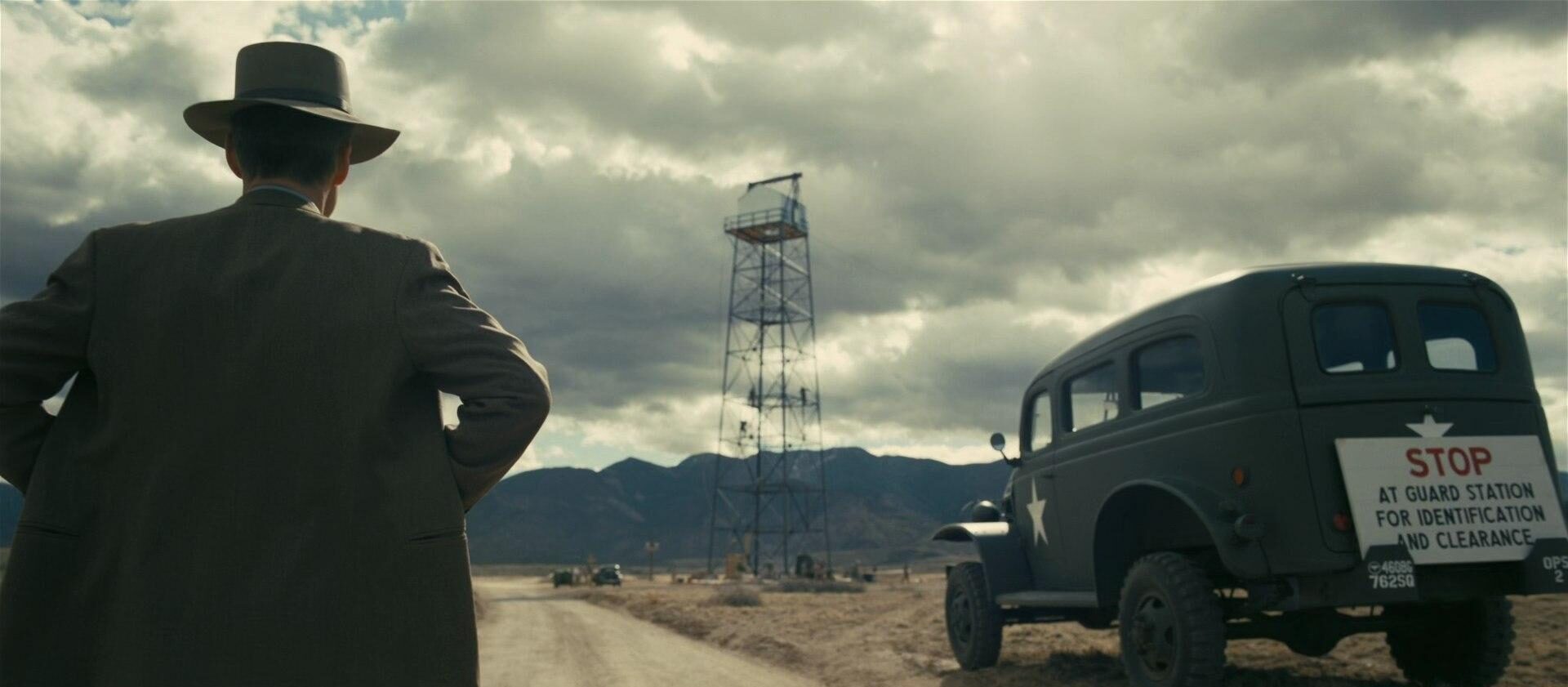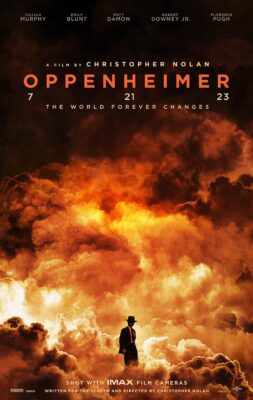

“This isn’t a new weapon, it’s a new world.”
Christopher Nolan has always written films that toy with our perception of time, usually delivering thrilling plots that feel a little too fussily contrived and emotionally distant when you think back on them. With Dunkirk, he proved that he could find ways to apply his timeline sleight-of-hand to historical narratives. In Oppenheimer—based on American Prometheus by Kai Bird and Martin J. Sherwin—the trick is that the chronology of the subject’s life story doesn’t line up with a typical cinematic narrative, in that there are two separate postmortem hearings that are crucial to his legacy but aren’t nearly as exciting as developing and detonating a nuclear bomb. Nolan arranges his screenplay in a confounding but ultimately slick and effective manner, layering both hearings on top of the main narrative, sometimes splicing together conversations that take place years apart.
One of the film’s potential flaws is that it either assumes familiarity with the subject matter, or believes that the viewer’s hour or so of floundering around trying to comprehend all three situations and log the expansive roster of scientists, officials, acquaintances, etc. will not hinder their ultimate connection to the film. The basics of the plot are as follows: J. Robert Oppenheimer (Cillian Murphy), a man of surpassing intellect, is selected by General Leslie Groves (Matt Damon) to lead the Manhattan Project despite his previous Communist sympathies and the card-carrying past of his wife (Emily Blunt). He builds a secret city in the New Mexico Desert and hires a team of talented personnel, ultimately leading to the Trinity Test, which gave President Truman (Gary Oldman) the confidence to bomb Hiroshima and Nagasaki, thus bringing an end to the war. Oppenheimer, envisioning the end of the world and his part in it, does not support the United States’ continued participation in an arms race. Aware that the physicist has become an American icon whose opinions could sway political opinions, and also due to personal vindictiveness for petty and imagined slights, American Energy Commission chairman Lewis Strauss (Robert Downey Jr.) orchestrates a biased private hearing for the renewal of Oppenheimer’s security clearance, which is denied. Later, Strauss’s nomination for Secretary of Commerce is voted down due to his role in arranging Oppenheimer’s downfall.
I’ve left out a ton of pertinent details and about two dozen characters—there are roles here for Florence Pugh, Josh Hartnett, Casey Affleck, Rami Malek, Kenneth Branagh, Benny Safdie, Jason Clarke, Matthew Modine, Macon Blair, Alex Wolff, Josh Peck, James Remar, Tom Conti, and many others—but the film itself isn’t always up to the task of telling its story and defining its characters. Oftentimes the editing is so rapid-fire—in conversations, in transitions between timelines, in the montage of building Los Alamos and the bombs themselves—that the shots cut before we’ve even had time to register what we’ve seen and heard. Blunt’s performance as Oppenheimer’s wife is terrific in the back half but it’s hard to tell if she will play a significant part in the story based on her appearances in the first half. I wouldn’t hold the opinion too strongly if someone wanted to disagree, but the film seems reluctant to define its central figure as well, giving Murphy the challenge of exhibiting a magnetic but opaque persona across several decades in time. We get little vignettes about his interest in communist ideas, his vast intellect and curiosity that sees various religious and psychoanalytical texts on his bookshelf, his romantic pursuits, his connections with other notable scientists (Albert Einstein, Neils Bohr, Richard Feynman), and so on, but these are all place-setting for the central idea of a man-made weapon with the potential to destroy the world, and the burden that must rest on the shoulders of the man most easily identifiable as its architect.
In this it succeeds brilliantly, employing elliptical, non-linear montage to establish a sense of majestic terror that left a similar impression to Denis Villeneuve’s epic-image storytelling in Dune: Part Two. We get all these little bits of jargon and fragmented scenes that suggest the long relationships and commitments between the characters and deep knowledge on niche subjects, but we only ever get a chance to settle in when the team all waits in anticipation of the Trinity Test. Nolan renders the blast in near-silence, a brilliant creative decision that finally allows us to breathe just as the most breathtaking images flash on the screen, though they are decidedly not as awesome as Nolan could have made them, making the whole thing feel unfulfilling and unglamorous. Beholding the unholy terror of the bomb, the haunted genius immediately utters the famous phrase from the Bhagavad Gita: “Now I am become death, the destroyer of worlds.” Elsewhere, abstract, non-diegetic inserts give us brief glimpses into Oppenheimer’s disturbed mental state: swirling atoms, flashes of light, undead victims of the bomb screaming while he gives a speech to a cheering crowd, his mistress naked upon his lap during the hearing. This is a man of science who is not willing to go wherever his intellect leads him, whose scientific pursuits are bounded by moral limits.
Oppenheimer is a paradoxical film, much like its subject: a work of grand ambition that unfolds with restraint, a character study that is emotionally stunted even as it evokes a slow, mounting dread. It’s a film driven more by ideas than feelings, more by images than plot beats—an intellectual puzzle that trades in moral ambiguity, theoretical extremes, and historical consequence. It’s much less immediately thrilling than the standard Christopher Nolan picture. It’s probably a bit overlong, a bit too obsessed with cramming historical figure cameos in for their own sake, and a bit too muddled with the double-hearing screenplay. It’s asking a lot to make the excitement and terror of the bomb’s development and use coexist with the two politics-is-corrupt hearings, and it doesn’t seem to get the dramatic balance right (I think some of Strauss’s story could have been sacrificed to give us more of Blunt and Pugh, who are underutilized). But it gets a ton of accurate history up on the screen, it interweaves a handful of challenging themes in a coherent manner, and leaves the viewer with much more to chew on after they’re done watching it, with an uneasy feeling resting in the pit of their stomach.